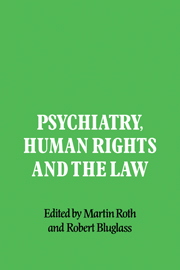Book contents
- Frontmatter
- Contents
- Editors' preface
- Contributors
- The historical background: the past 25 years since the Mental Health Act of 1959
- The social and medical consequences of recent legal reforms of mental health law in the USA: the criminalization of mental disorder
- The recent Mental Health Act in the United Kingdom: issues and perspectives
- Medical and social consequences of the Italian Psychiatric Care Act of 1978
- Lessons for the future drawn from United States legislation and experience
- Recent developments in relation to mental health and the law in the Federal Republic of Germany
- Psychopathy and dangerousness
- Dangerousness in social perspective
- Psychiatric explanations as excuses
- Detention of patients: administrative problems facing Mental Health Review Tribunals
- Developments in forensic psychiatry services in the National Health Service
- The role of psychiatry in prisons and ‘the right to punishment’
- Human rights in mental health
- Changes in mental health legislation as indicators of changing values and policies
- The Danish experience: one model of psychiatric testimony to courts of law
- A postscript on the discussions at the Cambridge Conference on Society, Psychiatry and the Law
Developments in forensic psychiatry services in the National Health Service
Published online by Cambridge University Press: 04 August 2010
- Frontmatter
- Contents
- Editors' preface
- Contributors
- The historical background: the past 25 years since the Mental Health Act of 1959
- The social and medical consequences of recent legal reforms of mental health law in the USA: the criminalization of mental disorder
- The recent Mental Health Act in the United Kingdom: issues and perspectives
- Medical and social consequences of the Italian Psychiatric Care Act of 1978
- Lessons for the future drawn from United States legislation and experience
- Recent developments in relation to mental health and the law in the Federal Republic of Germany
- Psychopathy and dangerousness
- Dangerousness in social perspective
- Psychiatric explanations as excuses
- Detention of patients: administrative problems facing Mental Health Review Tribunals
- Developments in forensic psychiatry services in the National Health Service
- The role of psychiatry in prisons and ‘the right to punishment’
- Human rights in mental health
- Changes in mental health legislation as indicators of changing values and policies
- The Danish experience: one model of psychiatric testimony to courts of law
- A postscript on the discussions at the Cambridge Conference on Society, Psychiatry and the Law
Summary
This paper aims to describe the present state of forensic psychiatry services in the United Kingdom. These services can be divided into those provided by Special Hospitals for the whole country by the Department of Health and Social Security (DHSS), and secure units and community forensic psychiatry services provided by the National Health Service (NHS) regions. Only passing reference is made to the Prison Medical Service, as that is covered in the following chapter by Professor Gunn.
Special Hospitals
Many incorrectly believe forensic psychiatry to be a fairly new specialty within the profession, whereas it is of the same age as general psychiatry in terms of the provision of institutional facilities. The national system of mental hospitals originated in the County Asylums Act of 1808 and the provision of special facilities for mentally abnormal offenders can be dated from the year 1800 when a paranoid schizophrenic, James Hadfield, was found not guilty by reason of insanity of shooting at King George III. At his trial the judge commented: ‘this unfortunate man should be cared for, all mercy and humanity being shown’. Hadfield was committed to the long-established Bethlem Hospital in London which had added to it a criminal wing, and to ensure his legal detention the first Criminal Lunatics Act was passed to cater for those acquitted on the grounds of insanity or found insane on arraignment and ordered to be detained in custody ‘until His Majesty's Pleasure be known’.
- Type
- Chapter
- Information
- Psychiatry, Human Rights and the Law , pp. 123 - 137Publisher: Cambridge University PressPrint publication year: 1985
- 1
- Cited by



